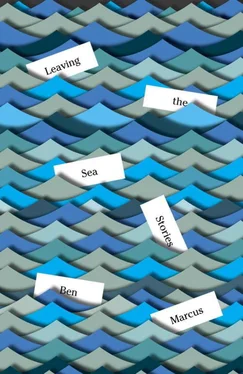After dinner Fleming went to the front desk to see if C. L. Levy was on board. Of course they couldn’t give out that information.
“Isn’t there a passenger manifest?”
Yes, there was a passenger manifest, but it wasn’t for passengers.
Back in his cabin, Fleming told Erin about it on the phone. The missing student, the possibility that someone had gone overboard last night, and the ensuing head count that woke him up.
“Huh,” she said.
“Weird, right?”
“I guess. I mean it’s not really that weird. It’s normal for them to do a head count. Is that what you said was weird? Or was something else weird?”
Dear Jesus, what was going on between them?
He took on the overly patient tone she hated. Explained it slowly. Offered a short course on the uncanny for his wife. Theories and origins of strangeness. And then, when he was done, Erin had been proved right, again without speaking. None of it seemed particularly weird. When you put it that way.
“I feel concerned, that’s all.”
This surprised Erin. Had he never expressed concern before? “I don’t know why you’re telling me . If you were really worried, wouldn’t you have done something about it instead of calling me?”
“Okay, I won’t talk about this to you anymore, I promise.”
“Oh, you’re going to pout now?”
“Gosh, Erin, I still haven’t stopped pouting from last time. But I have more pouting saved up after this pouting is finished. Don’t worry, I’ll let you know when the new pouting starts.”
She hung up.
On the way out of his room, Britt was waiting for him in the hallway, waving a black glove.
The little stalker had found his room.
“How come you’re not writing?” he asked, as if he’d run into her in public somewhere. Some cheerful patter, instead of screaming his head off in fright.
“How come you’re not, Professor?”
Did Fleming have this to look forward to every time he came and went? Could he get a new room? He’d sleep in the fucking lifeboat if he had to. He’d play it off cheerfully, using the deep reserves of cheer he stored in his infinitely sized happy place. He had cheer to goddamn spare. Maybe he’d get another room just to stash his extra cheer. How other people, Erin most of all, shook off moods, or, more impressively, pretended not to have them in the first place, was entirely beyond him. Except what wasn’t beyond him? Was there anything?
“What’s going on with the glove?” he said, like a person to whom this was really happening. “It’s warm out.”
“Well, I’m glad you asked.”
Britt gave him a weird smile. There was food in her teeth. He didn’t know her well enough to mention it. Thank God.
“This, sir, is a brand-new glove. I just took it from its package.” Britt flopped the glove against her face—a gesture of, what, self-harm?—then added, blushing, almost too quiet to hear: “No one has been pleasured with it yet.”
Fleming studied the glove, leaned in, and pretended to sniff it. “That you know of,” he said, in his scientific voice.
Britt laughed. “You are funny. We’ve been debating this. I’ve had to defend you. They think you’re so serious. But you’re not! You, my friend, are catching on.”
She swished the glove at his face and he leaned away from it.
“I am catching on, Britt. You might try that glove on someone else. Go throughout the longship, trying it on every young oarsman.”
“But I don’t want to go throughout the longship. I have traveled far, good sir. I am home now. I have found the owner of the glove.”
She baby-pouted up at him.
“No thank you, Britt.”
“You don’t know what you’re missing!”
“True,” he said, walking off.
And neither did she. What Fleming was missing was a home and family and self that had never quite come to be, which was maybe why he was on a boat now with strangers, pitying himself. How could you miss something that hadn’t happened? There was a certain feeling at home with Erin and Sylvie that sometimes, rarely, despite the prickly ways they fought, swept through them, for reasons he could not understand, little gusts of unexamined happiness when he and Erin smiled at each other for no reason and when they stretched out on the rug and played blocks with Sylvie and when Sylvie would roll over and suddenly yell “Pants!” kicking her naked legs in the air. A serious call for pants from his young daughter that made them laugh so hard. That’s what he missed, but it stood alone. Had it really even happened that way? And if something like it happened again, who knows, Fleming or Erin or both of them would react differently, would look away from each other, embarrassed that they’d suddenly been caught living while poor Sylvie shrieked with joy under the cold gaze of her functionally dead parents.
From the house phone outside the restaurant Fleming dialed the ship’s operator and asked to be connected to the room of C. L. Levy.
“I have no such passenger,” said the operator.
“As of when?” asked Fleming.
“I’m sorry?”
“Did you ever have a passenger by that name?”
“You mean ever on the ship? That’s not really something I can look up.”
Oh, but you fucking can, you master of the database. “I mean up until yesterday. Was there a C. L. Levy yesterday and now there is not one today?”
“But we haven’t put into port yet. No one has left the ship.”
Fleming paused. “It does stretch the imagination,” he admitted. He pictured C. L. Levy, just a shadow, standing on the ship’s railing, tilting out of sight. They say you can’t hear the splash. He bet to hell you could hear the splash. Something that awful could never be silent.
“Sir, I apologize, I’m not sure I can help you.”
“Thank you,” said Fleming. “I understand.”
But he didn’t, and he wouldn’t, and he couldn’t. The encounter joined too many others in the bottomless gunnysack he lugged around for situations that didn’t, maybe never would, make sense. He’d become a bit of a collector, but was the material worth anything? Everything unbelievable in his whole life that had nevertheless still happened. It would need to be probed for secrets.
Out on deck it wasn’t dark enough to hide. His students would be roaming the ship, drinking, waiting behind fake bushes so they could jump out at him when he walked by. The stars were close tonight. Not just exquisite pricks of light leaking through a tear in the fabric of some other world, to quote a writer he loved. These stars seemed to have fallen too low. They looked shapeless and dirty. Cast outs, perhaps, from the world of finer stars that knew enough to keep their distance. Or maybe the ship was climbing, lurching straight up out of the water like a slow rocket. He could close his eyes, feel the air rushing down on him, and believe that. Why was that so easy to believe, and it wasn’t true, yet what was true was so finally impossible and unconvincing? The stars—close and dirty and shapeless and false, the sort a child might draw, and what did children even know?—were not credible. The sky, the whole night, his conversations. These things did not fucking ring true anymore, they needed work . What happened to him needed to be revised until he could find it believable. Or, he needed to be revised. Fleming. He needed to change himself so what was real did not seem so alien and wrong. Do you do that with tools, with your hands, with a bag over your head? Do you do that by standing on the ship’s railing at night? Fleming would tuck himself over behind the pool, behind the games floor, where the sun umbrellas were rolled up, stacked, and chained. It was a kind of bed. It wasn’t so bad. The dark night was a kind of room, and it would do better than where he’d been. This was the perfect place to miss out on the next head count, should it come. No one would find him here, at least until morning. They could never check off his name. Maybe that was what was called for, for the next head count to go around, for the ship and its rooms to be searched for its living, viable people—its human beings!—and to be finally, once and for all, counted out.
Читать дальше












